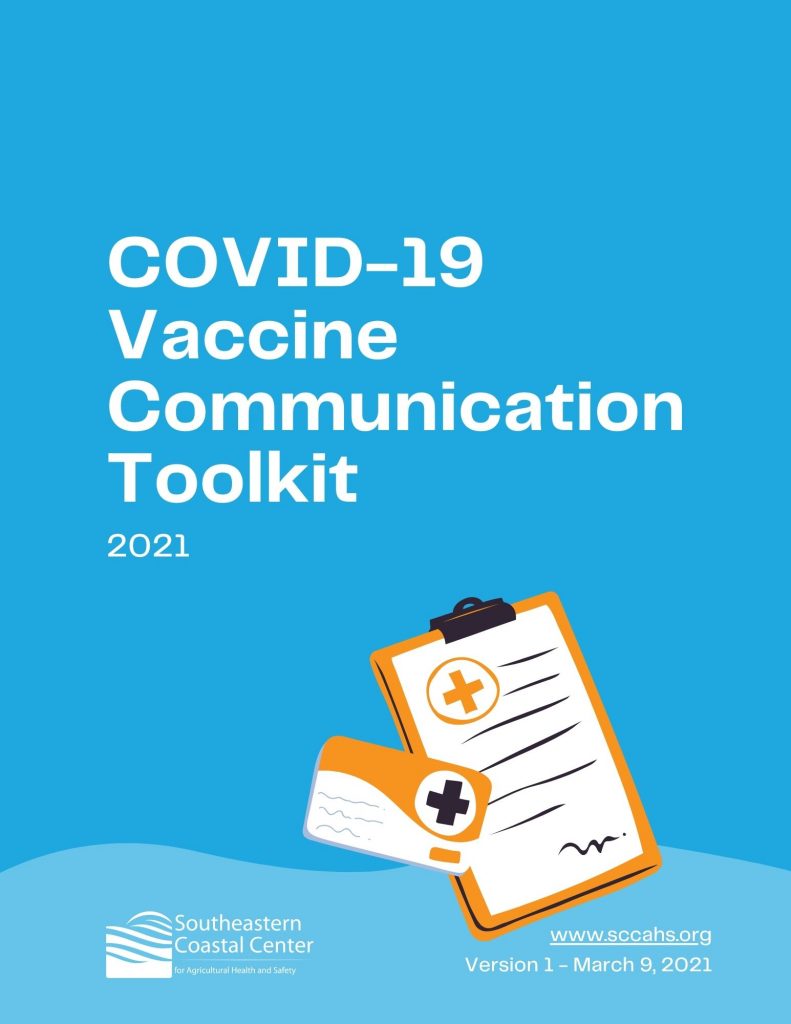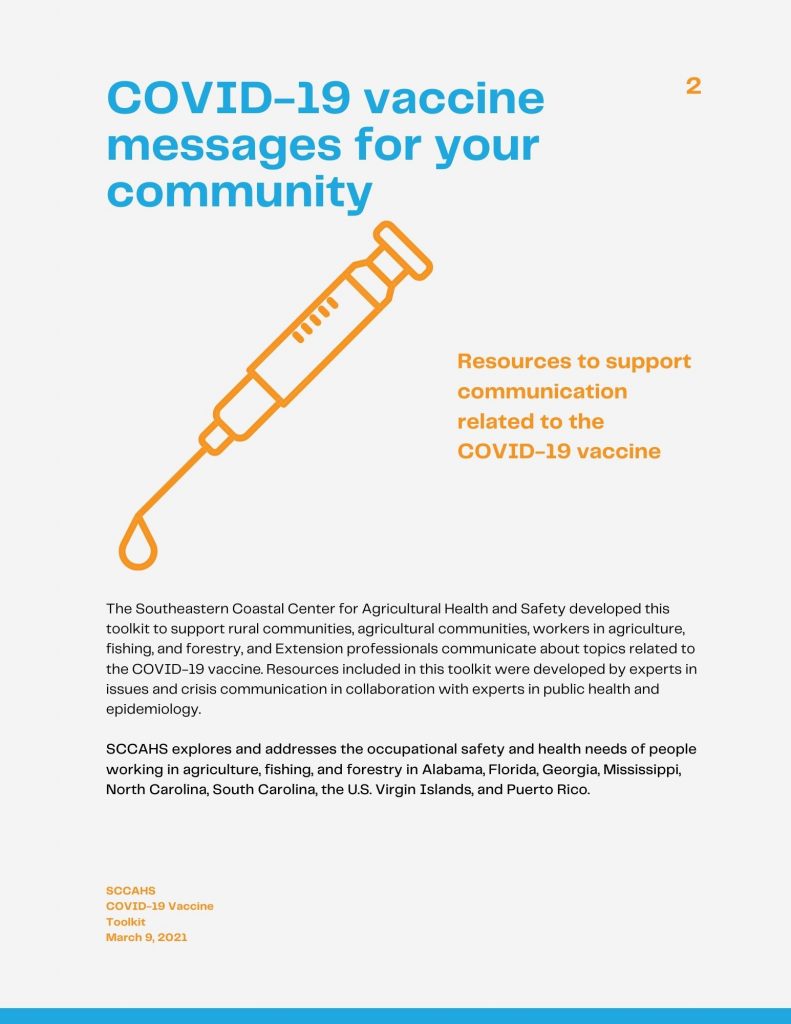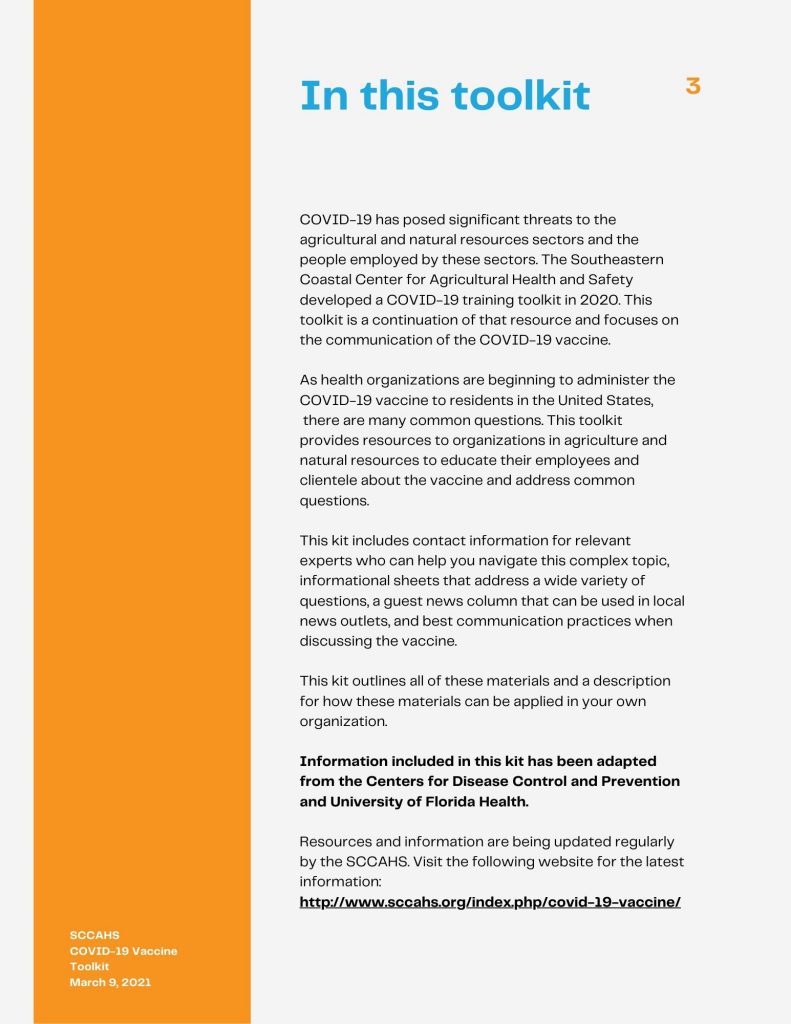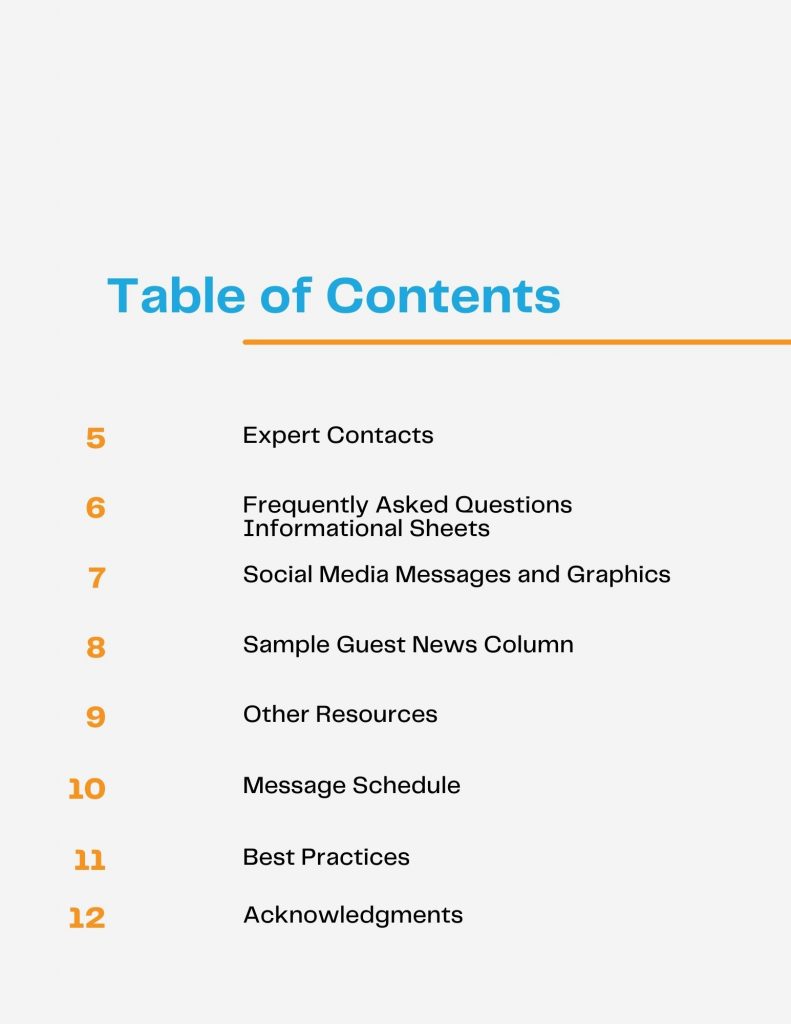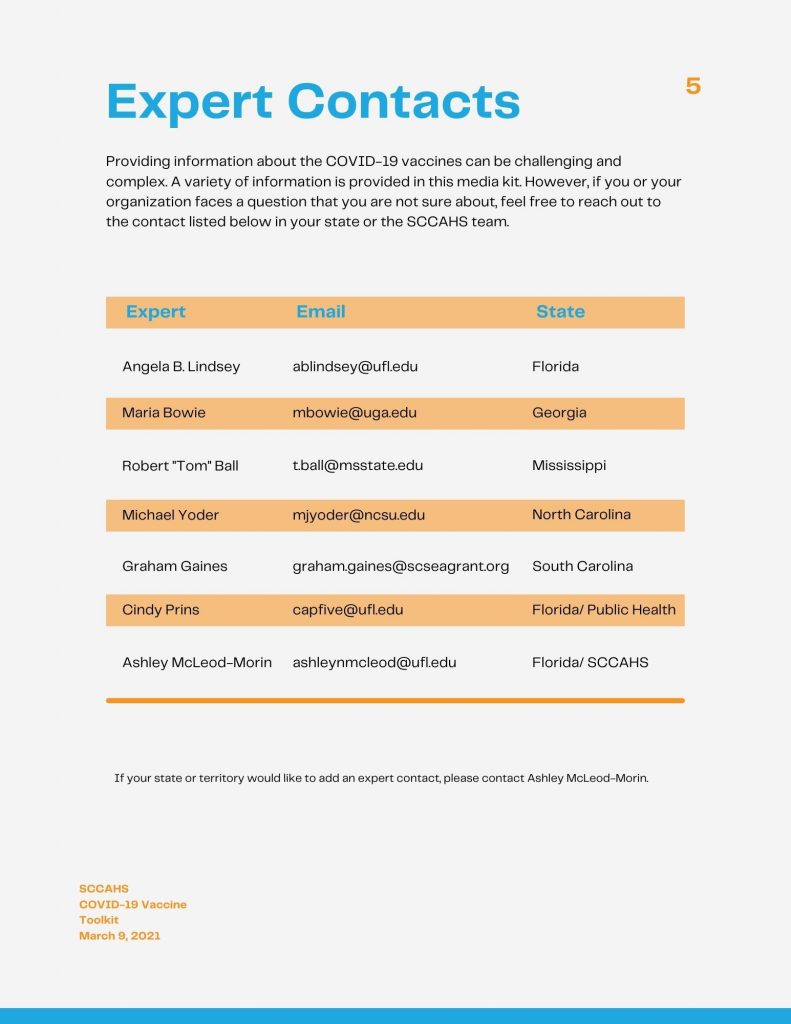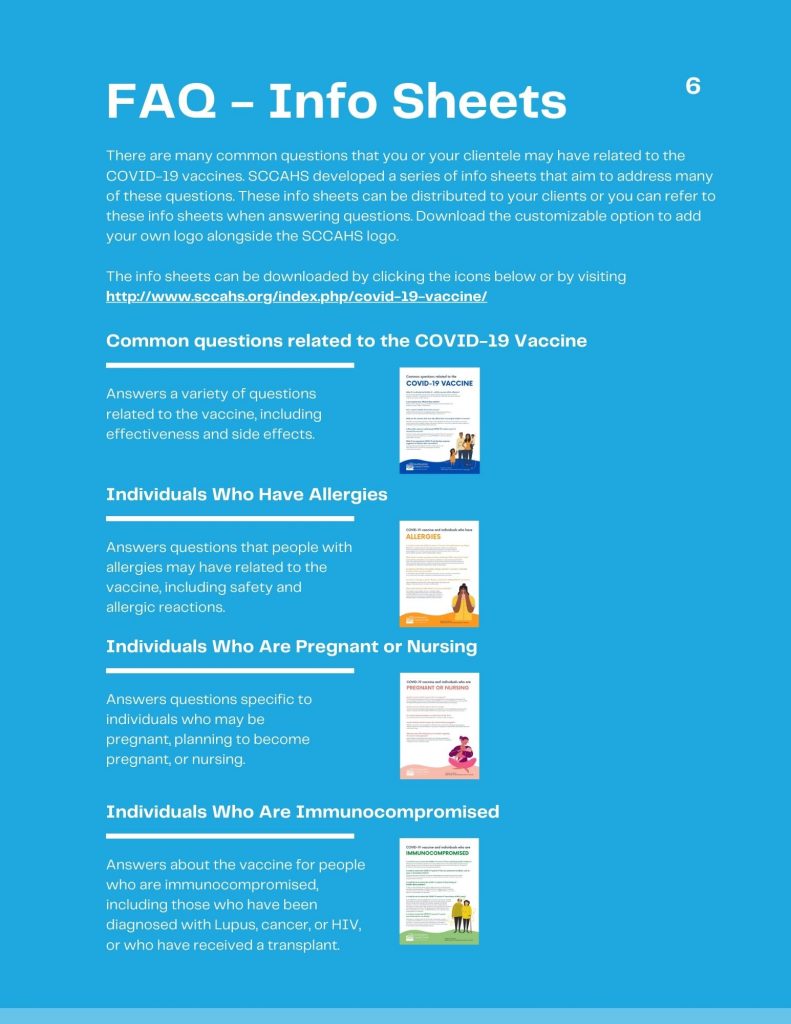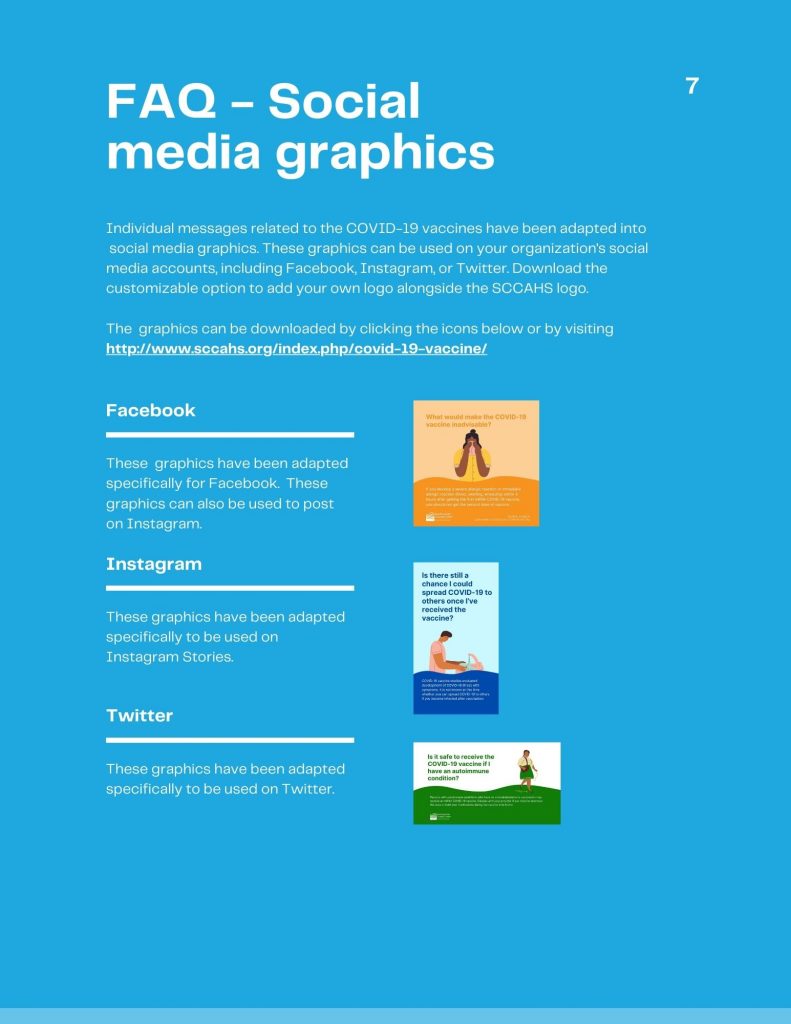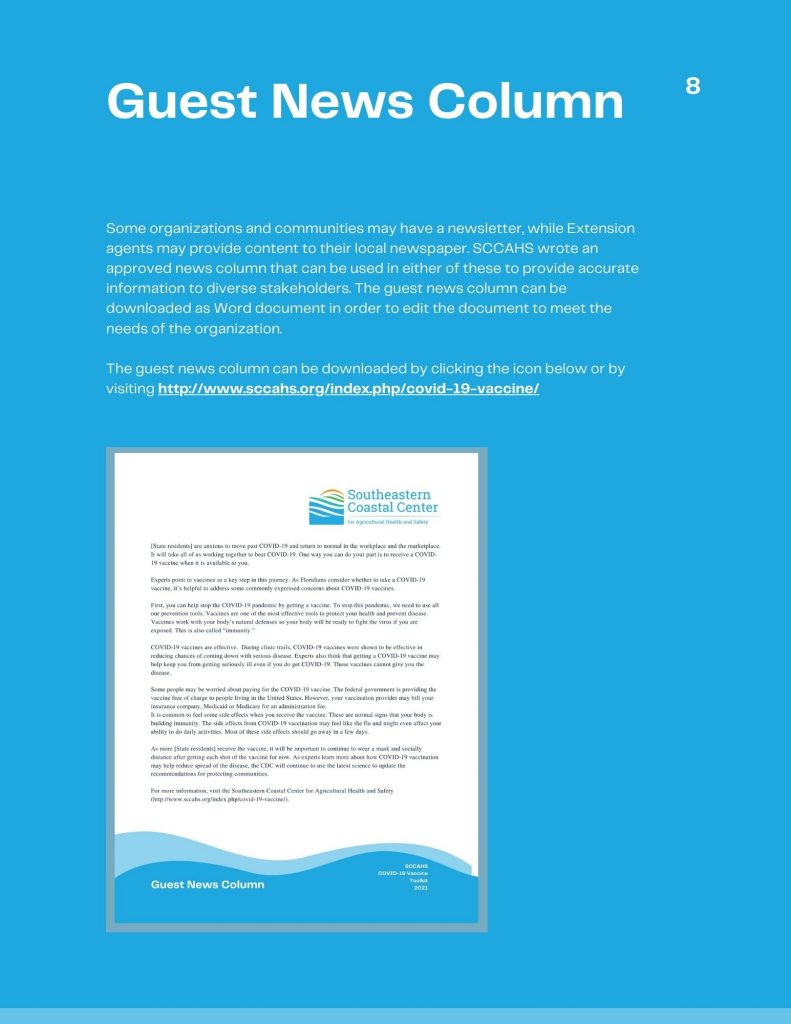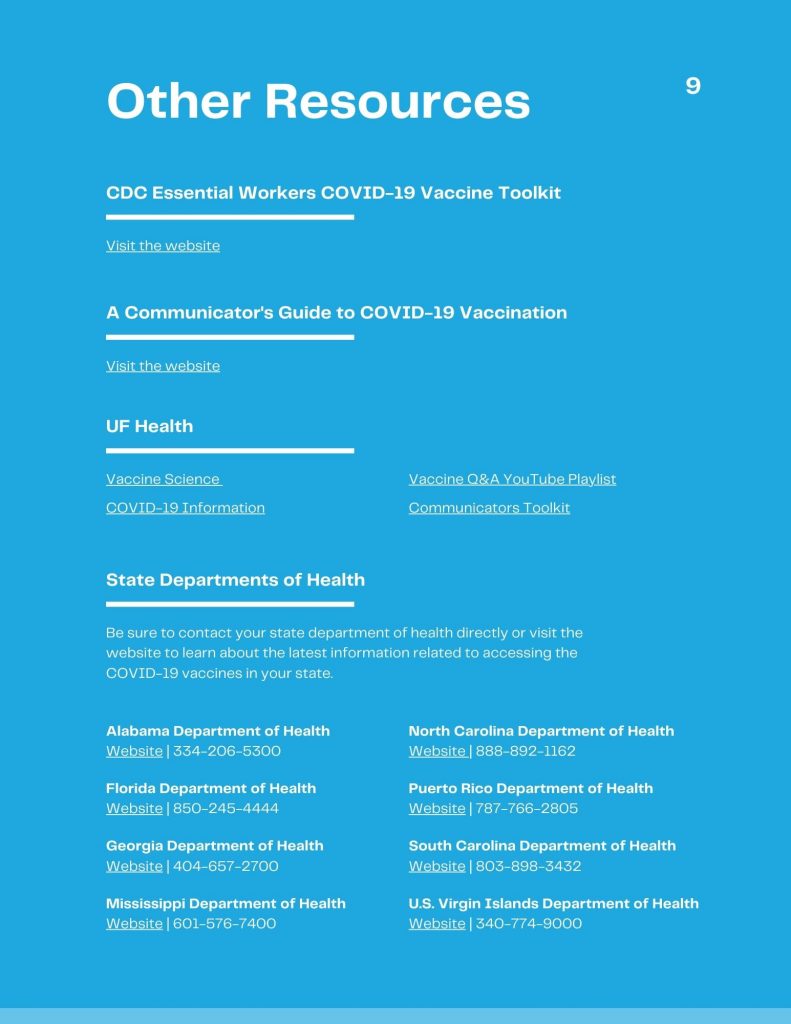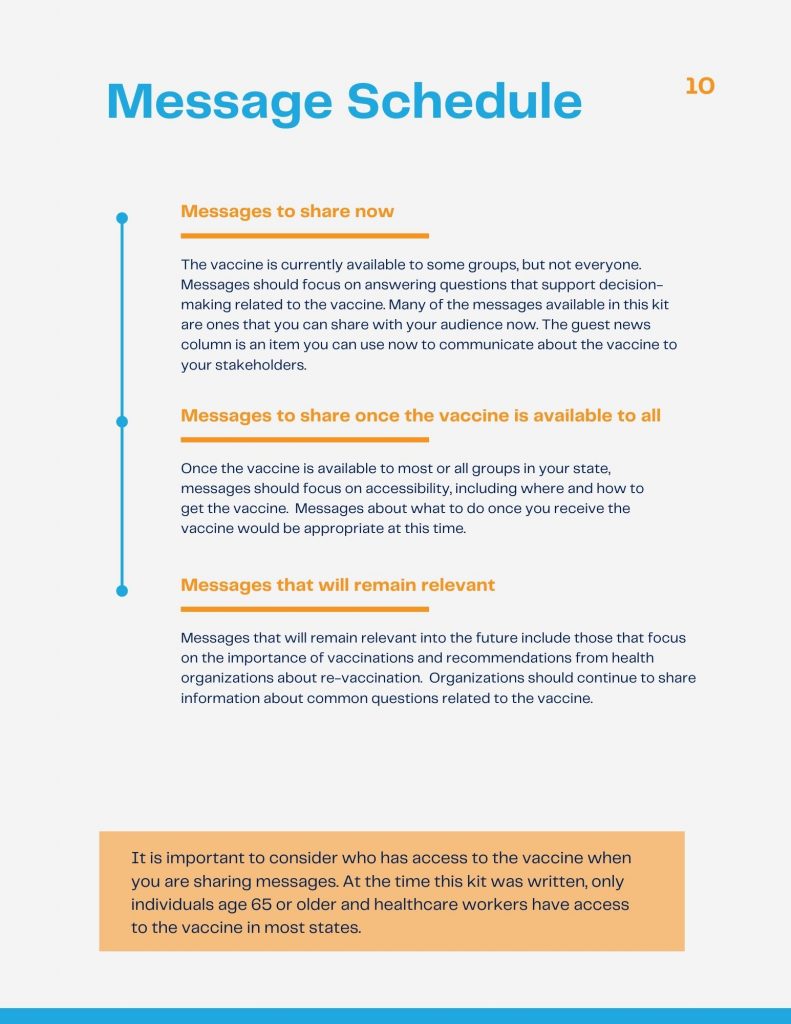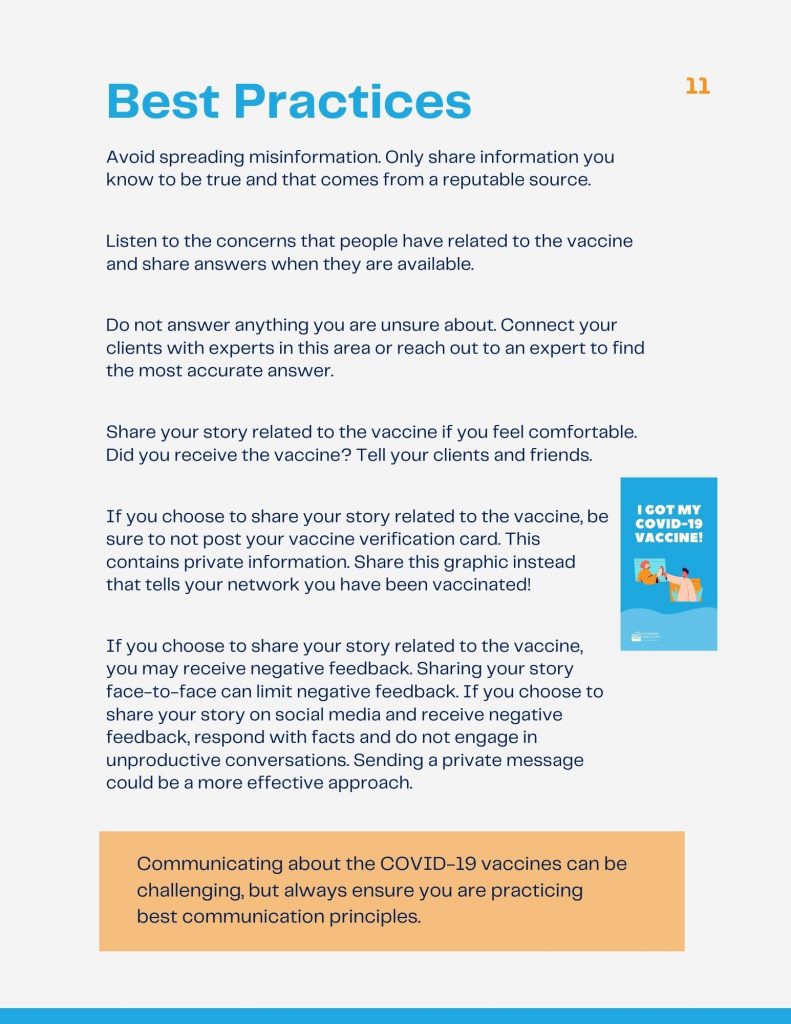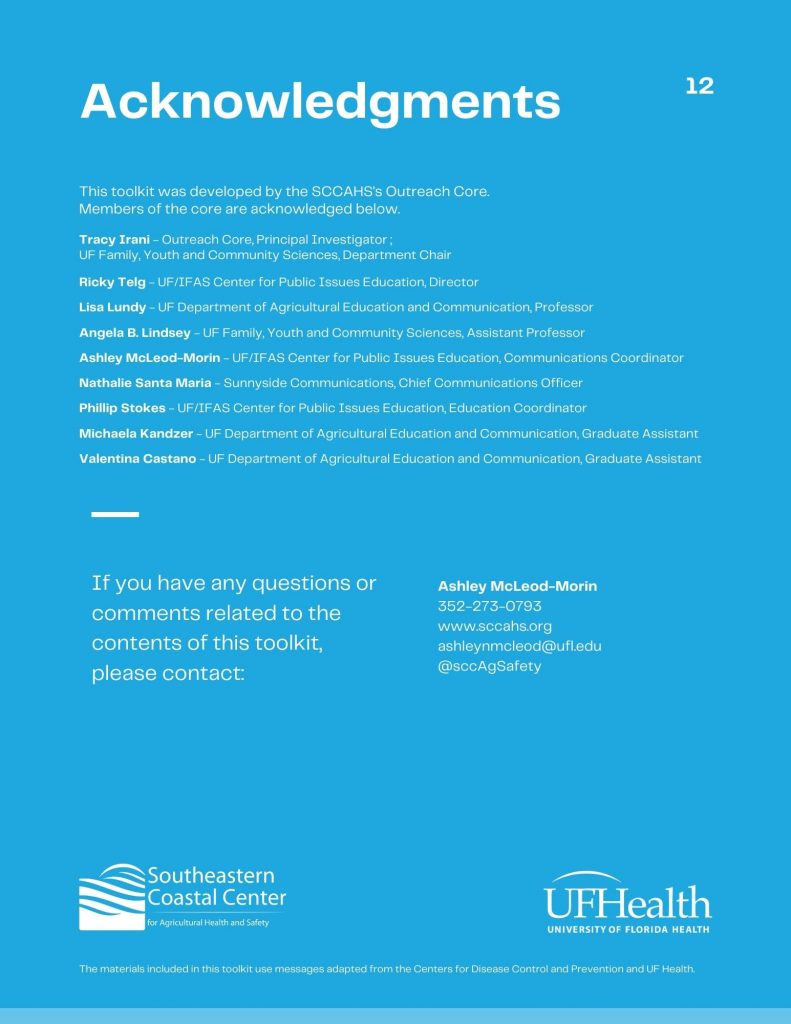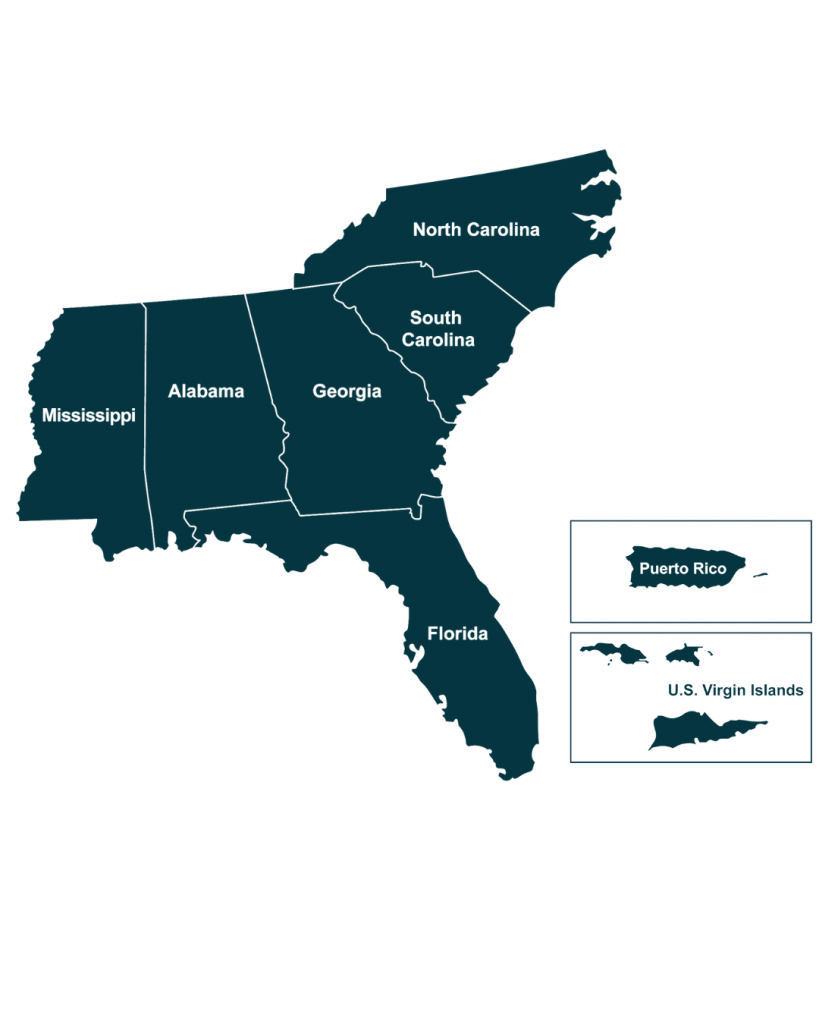Turn the pages to explore the toolkit or download the toolkit. You may also watch the webinar recording that introduces the toolkit. Components of the Vaccine Communication Toolkit are also available in Spanish, Haitian Creole, and Vietnamese. Please scroll below the English components on this page to find materials in these three languages.
COVID-19 Delta Variant Resources
SCCAHS COVID-19 Vaccine Town Hall
Dr. Glenn Morris, Center director and director of the University of Florida Emerging Pathogens Institute, and Dr. Ira Longini, Co-director of Center for Statistics and Quantitative Infectious Diseases provided the latest updates on COVID-19 transmission and vaccines, as of January 26, 2021. Watch the Recording
State and Territory Resources
Alabama
Florida
- Vaccine information from Florida Department of Health
- Florida vaccination plan – extended
- Vaccine FAQs from UF Health
- Common myths from UF Health
- Vaccine science from UF Health
- Vaccine safety from UF Health
- COVID-19 Vaccine Town Hall English|Spanish
Georgia
Mississippi
North Carolina
Puerto Rico
South Carolina
- COVID-19 Vaccine FAQs from South Carolina Department of Health
- South Carolina Department of Health COVID-19 Vaccine webpage
U.S. Virgin Islands
Other
Federal Resources
Vaccine Communication Toolkit for Essential Workers (Webpage)
How the CDC is making COVID-19 vaccine recommendations (Webpage)
Ensuring the safety of COVID-19 vaccines (Webpage)
Benefits of getting a COVID-19 vaccine (Webpage)
8 things to know about COVID-19 vaccine planning (Webpage)
COVID-19 vaccine FAQ (Webpage)
Understanding how COVID-19 vaccines work (Webpage)
Frequently Asked Questions
Common Questions about the Vaccine
What if I’ve already had COVID-19 – will the vaccine still be effective? Yes! The vaccines generate a strong immune response against a key protein the virus needs to establish an infection. It is beneficial to have the immune system make these neutralizing antibodies to best protect against another infection.
Is one vaccine more effective than another? At this time, there appears to be no real difference between the Pfizer and Moderna vaccines in safety or effectiveness.
Can I contract COVID-19 from the vaccine? Neither the Pfizer nor the Moderna vaccine contains the coronavirus, so recipients cannot be infected with COVID-19 through its administration.
What are the common short-term side effects from receiving the COVID-19 vaccine? Side effects that have been reported are similar to those identified after other vaccines including: arm soreness, muscle and joint aches, headache, fatigue, chills and low-grade fever. These mild to moderate reactions appear to be relatively common especially after the second dose.
Is there still a chance I could spread COVID-19 to others once I’ve received the vaccine? COVID-19 vaccine studies evaluated development of COVID-19 illness with symptoms. It is not known at this time whether you can spread COVID-19 to others if you become infected after vaccination.
What if I am exposed to COVID-19 and develop symptoms suggestive of infection after vaccination? You should isolate and get tested for COVID-19 as the vaccine is not 100% effective and it is unclear how long people will maintain immunity after vaccination.
Individuals who are Pregnant or Nursing
Are the vaccines safe for women who are pregnant? The Pfizer and Moderna vaccines are considered low-risk for people who are pregnant. The American College of Obstetricians and Gynecologists (ACOG) recommends that COVID-19 vaccines should NOT be withheld from pregnant women who meet criteria for vaccination based on priority groups.
Do I need to obtain clearance or a letter from my Ob-Gyn? A conversation with your clinician may be helpful, but no clearance or letter is required.
Are the vaccines safe for women who want to become pregnant? COVID-19 vaccination is recommended to be offered to women considering or actively pursuing pregnancy. Pregnancy testing is not recommended prior to vaccination. If pregnancy is identified after the first dose, the second dose should be taken.
What are some of the things for me to consider regarding the vaccine and pregnancy? Level of exposure risk and community prevalence are important considerations. Pregnant women are vulnerable to more severe illness from COVID-19 compared to nonpregnant women of reproductive age.
Individuals who are Immunocompromised
Is it safe for me to receive the COVID-19 vaccine if I have underlying health conditions? While persons with all health conditions have not been included in the vaccine studies, based on guidance from the Centers for Disease Control and Prevention, Food and Drug Administration and clinical societies, it is thought that the benefit of receiving the vaccine outweighs the potential risk.
Is it safe to receive the COVID-19 vaccine if I have an autoimmune condition, such as Lupus or rheumatoid arthritis? Persons with autoimmune conditions who have no contraindications to vaccination may receive an mRNA COVID-19 vaccine. Discuss with your provider if you need to decrease the dose or hold your medications during the vaccine time frame.
Is it safe for me to receive the COVID-19 vaccine if I have history of Guillain-Barré syndrome?To date, no cases of Guillain-Barré syndrome (GBS) have been reported following vaccination among participants in the Pfizeror Moderna COVID-19 vaccines clinical trials. Persons with a history of GBS may receive an mRNA COVID-19 vaccine unless they have a contraindication to vaccination.
Is it safe for me to receive the COVID-19 vaccine if I have history of Bell’s palsy? Cases of Bell’s palsy were reported following vaccination in participants in both the Pfizer and Moderna COVID-19 vaccines clinical trials. However, the FDA does not consider these to be above the frequency expected in the general population and has not concluded that these cases were causally related to vaccination. Post-authorization safety surveillance will be important to further assess any possible causal association. In the absence of such evidence, persons with a history of Bell’s palsy may receive an mRNA COVID-19 vaccine unless they have a contraindication to vaccination.
Is it safe to receive the COVID-19 vaccine if I receive immunotherapy for my allergy? While these is no evidence from the clinical trials on this specific condition, you should receive COVID-19 vaccination if you have no contraindications to vaccination. If you have a history of severe allergy to prior vaccinations, discuss your particular situation with your doctor so that a plan can be made for vaccination under the safest possible conditions.
Individuals with Allergies
Is it safe to receive the COVID-19 vaccine if I receive immunotherapy for my allergy? While there is no evidence from the clinical trials on this specific condition, you should receive COVID-19 vaccination if you have no contraindications to vaccination. If you have a history of severe allergy to prior vaccinations, discuss your particular situation with your doctor so that a plan can be made for vaccination under the safest possible conditions.
What should I consider regarding my history of allergies? What steps should I take? People with history of immediate or severe reactions to medications or vaccines should consult with their doctor about receiving the vaccine. It is important to let the vaccination team know about this because you will be monitored for 30 minutes for a potential reaction. All vaccination teams have trained personnel and are equipped with medications and protocols to handle a severe reaction.
Are patients with history of immediate allergic reactions to vaccines or injectable therapies able to get vaccinated? It is reasonable to discuss benefits and risks with your provider. If you do not have a contraindication for the vaccine and if vaccination is decided, you should be observed for 30 minutes.
Are patients with egg or gelatin allergy candidates for mRNA COVID-19 vaccination? Pfizer and Moderna vaccines do NOT contain eggs or gelatin; thus, persons with allergies to these substances do not have a contraindication.
What would make the mRNA COVID-19 vaccine inadvisable? If you develop a severe allergic reaction or immediate allergic reaction (hives, swelling, wheezing) within 4 hours after getting the first mRNA COVID-19 vaccine, you should not get the second dose of vaccine. Similarly, if you have a prior immediate allergic reaction to polyethylene glycol or polysorbate, should not receive vaccination.
Access to Vaccine
Who is the vaccine recommended for? ACIP recommended use of the Pfizer and Moderna vaccines in persons 16 years of age or older under the Emergency Use Authorization.
Do I really need both shots? Can’t I just get the first one and have pretty good protection? The trials were for two doses. It’s not approved as a one-dose vaccine. In other words, the Emergency Use Authorization (EUA) does not allow for giving just one dose. Needs to be 21 days apart, but can be longer.
If I get one vaccine for the first shot, can I get the other vaccine for the second shot? No. You will receive a vaccination card and details about the specific vaccine you received.
Safety of Vaccine
What side effects are there from the vaccine? Local reactions included redness, swelling, pain at the injection site. Systemic reactions included fever, fatigue, headache, chills. The median onset for this was 1-2 days after either dose. Lasted a median duration of one day.
How can the vaccine be safe if it was developed so fast? Researchers used existing networks to conduct vaccine trials. Manufacturing began while clinical trials were still underway. mRNA vaccines are faster to produce than traditional vaccines. FDA and CDC prioritized review and authorization.
Is it safe? COVID-19 vaccines are held to the same safety standards as all vaccines.

